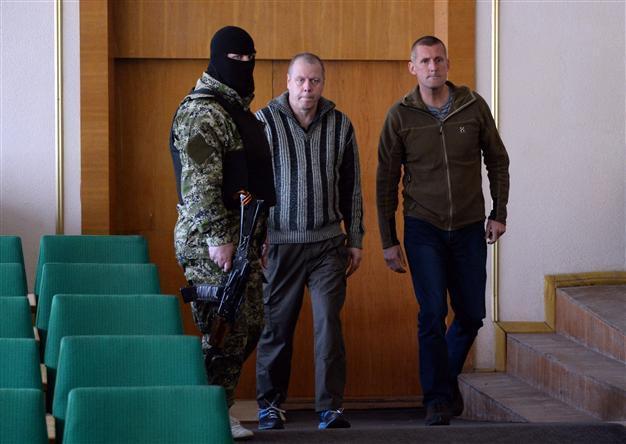Captured OSCE mission raises stakes in Ukraine crisis
SLAVYANSK - Agence France-Presse

Detained OSCE observers take part in a press conference of the pro-Russian separatist leader and self-proclaimed "people's mayor" of the eastern Ukrainian city of Slavyansk, Vyacheslav Ponomaryov (not pictured) in Slavyansk on April 27, 2014. AFP Photo
The detention by pro-Russian militants of a team of international military inspectors from the Organisation for Security and Cooperation in Europe has raised the stakes in the Ukraine crisis and sparked global outrage.
Rebels say the 12 captured men are "prisoners of war" and have accused them of being "NATO spies". Ukraine says they are being held as "human shields" in "inhuman conditions".
The eight European members of the group were presented to the media on Sunday. They said they were unharmed.
Following are some facts about the mission, where the team is being held and what the international community is demanding.
The original mission comprised 13 people, all men. There were eight European members of the OSCE mission: four Germans, a Dane, a Pole, a Swede and a Czech.
Accompanying them were five Ukrainian military personnel. One of these, believed to be the driver, was later released, meaning 12 are being held in total.
The OSCE says its "military verification visit" is being voluntarily hosted by Ukraine in order to "dispel concerns about unusual military activities".
Manned by unarmed military personnel, the inspection mission is separate from the OSCE's main Special Monitoring Mission, which currently numbers 122 civilians in 10 regions plus local staff and which is set to increase.
Members of the military verification mission attempted four times to enter Crimea but were rebuffed, with warning shots fired on March 8.
The men are being held in the town hall of Slavyansk, one of two buildings occupied by pro-Russian rebels there. Other hostages are being detained in the other building, originally belonging to the SBU security service.
An AFP journalist in Slavyansk says the town hall is a four-storey, grey, rectangular building guarded by a handful of militants behind barricades piled high with sandbags.
It is unclear how many militants are holed up inside the building.
The self-styled mayor of Slavyansk, Vyacheslav Ponomaryov, said the OSCE inspectors were "fine" and claimed they were not hostages but "guests".
Presented to the media on Sunday dressed in civilian clothes, they appeared unharmed.
Their spokesman, German officer Axel Schneider, stressed their diplomatic status and said they were not free to leave.
"For us here, the situation is very bizarre," he told reporters.
The four Ukrainians captured with the Europeans were not presented to the media.
Schneider said the eight Europeans were initially kept in a cellar but have since been moved to better accommodation in the town hall.
They said they had been "captured" by the insurgents on Friday, around four kilometres (two miles) outside Slavyansk as they were about to return to the regional hub city of Donetsk.
Rebels have insisted they are not part of the OSCE mission but instead "NATO spies", pointing to maps they had with them of rebel checkpoints.
They have described them as "prisoners of war" and said they will only release them in exchange for militants they say are being held by Kiev.
The detention of the men has provoked outrage in the West, with US President Barack Obama describing those holding them as "thugs".
The West swiftly called on Russia to use its influence over the rebels to secure their freedom. Moscow said it would do everything possible to achieve that but laid the blame at Ukraine's door, saying it was the host country's responsibility to assure their security.
Ponomaryov, the local rebel leader, said he has "no direct contact with Moscow" and refuses to negotiate with Ukrainian authorities which he does not recognise as legitimate.
The OSCE has sent a second team, of negotiators, to Slavyansk to bargain for the inspectors' release.
The defence minister of Germany, which is in command of the military verification mission, said the men were "not in Ukraine to intervene in any way".
Germany has set up a special crisis cell to resolve the problem and Berlin said it has held talks with senior Russian diplomats over the stand-off.
